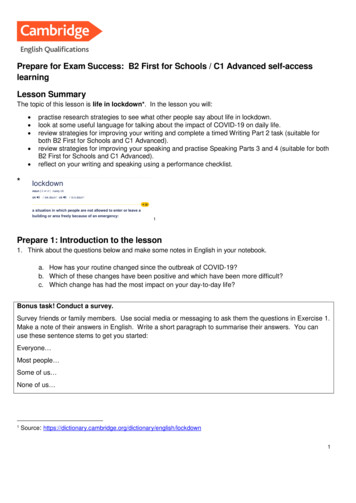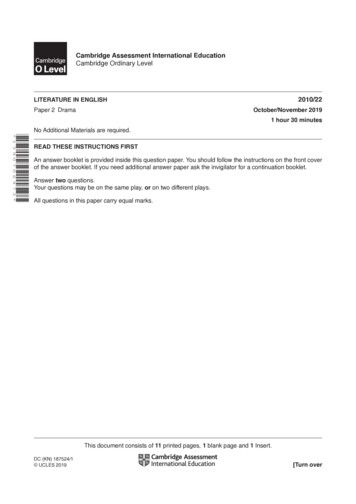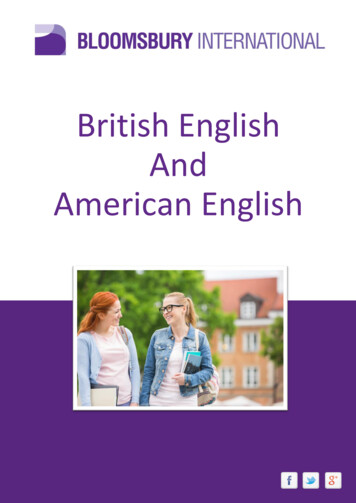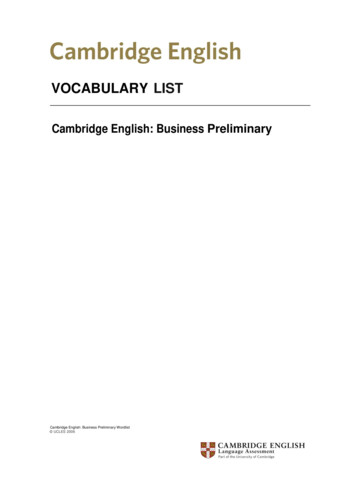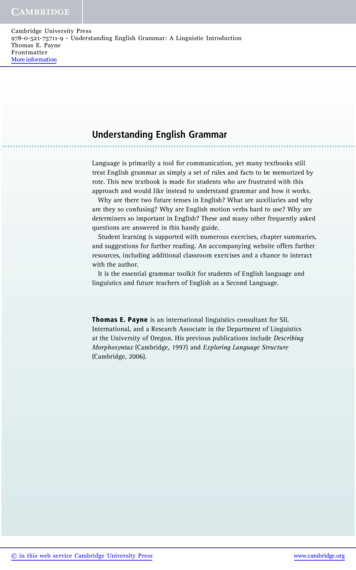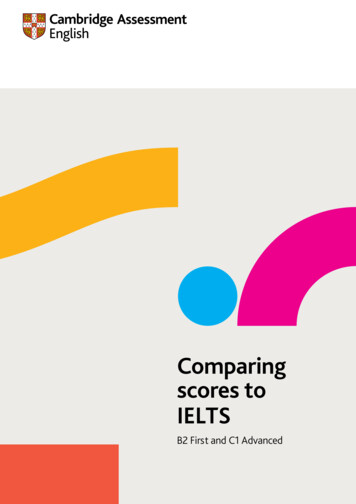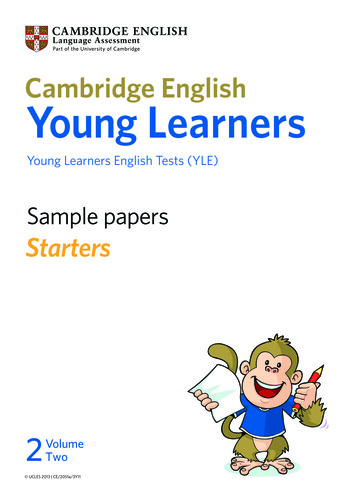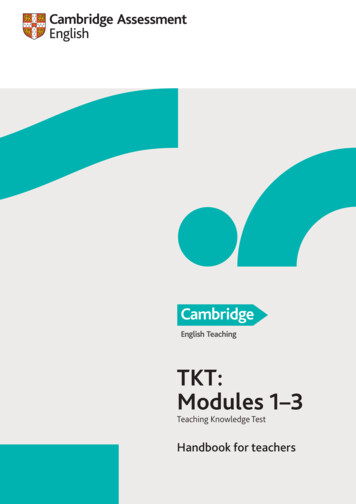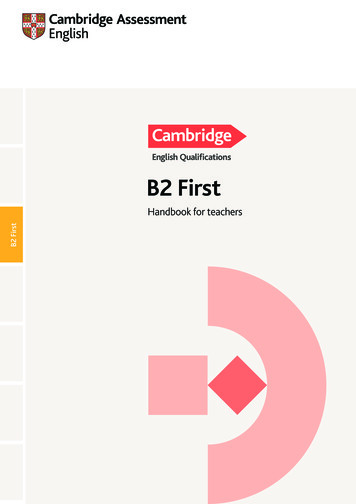
Transcription
B2 FirstB2 FirstHandbook for teachersPreA1
Your path tolearning English,step by stepcambridgeenglish.org/qualificationsC2 ProficiencyC1 AdvancedB2 FirstB1 PreliminaryA2 Key
Make the most of your handbookThe best way to get the most from your handbook is to use the digital version. The digital version isupdated more regularly.The digital version contains links which take you straight to related pages if you want to find out more. For example,you can read about Part 1 of the Reading and Use of English paper in the Tasks section, then click on the link to takeyou straight to a sample Part 1 task. There are also links which take you to useful websites and resources.TasksSample paper and assessmentThe Tasks pages give information about the exam format andwhat is tested in each part of the paper.The Sample paper and assessment section includes two samplepapers for each of the four components as well as answer keysfor the Reading and Use of English and Listening components. Forthe Writing and Speaking papers there is information about theassessment criteria, and for Writing there are example answers foryou to refer to or use with your learners.About Cambridge Assessment English 2B2 First – an overview 3Exam support 4About the exam 5Paper 1: Reading and Use of EnglishPaper 3: ListeningTasksTasks52Sample paper and assessment55Sample paper and assessment712Paper 2: WritingPaper 4: SpeakingTasks27Tasks71Sample paper and assessment31Sample paper and assessment75Speaking assessment glossary of terms84Glossary87
About Cambridge Assessment EnglishWe are Cambridge Assessment English. Part of the University ofCambridge, we help millions of people learn English and provetheir skills to the world.For us, learning English is more than just exams and grades.It’s about having the confidence to communicate and access alifetime of enriching experiences and opportunities.We deliver qualifications and tests in over 130 countries to over5.5 million people every year.One of the top universities in the worldDepartments of the UniversityCambridge English Qualifications are in-depth exams that makelearning English enjoyable, effective and rewarding.Our unique approach encourages continuous progression with aclear path to improving language skills. Each of our qualificationsfocuses on a level of the Common European Framework ofReference (CEFR), enabling learners to develop and build speaking,writing, reading and listening skills.Our qualifications are based on research into effective teachingand learning. They motivate people of all ages and abilities tolearn English and develop practical skills for the real world.We have Cambridge English Qualifications for: Schools General and higher education BusinessThe largest assessment research capability of its kind in EuropeWhether learners are planning to live, work or study in their owncountry or abroad, our qualifications prove they have the Englishlanguage skills to succeed.To find out more about Cambridge English Qualifications and theCEFR, go to cambridgeenglish.org/cefrDepartments (exam boards)Cambridge Assessment EnglishWe help millions of people learnEnglish and prove their skills to theworld.Cambridge AssessmentInternational EducationPrepares school students for life, helpingthem develop an informed curiosity anda lasting passion for learning.OCR: Oxford Cambridge and RSAExaminationsOxford Cambridge and RSA2A leading UK awarding body.
B2 First – an overviewB2 First was originally offered in 1939 and is a qualificationat upper-intermediate level that is officially recognised byuniversities, employers and governments around the world. Itfollows on as a progression from B1 Preliminary.CertificatesExam formats overall score on the Cambridge English ScaleB2 First can be taken as either a paper-based or a computer-basedexam. level on the CEFRThe certificate shows the candidate’s: score on the Cambridge English Scale for each of the four skillsand Use of English grade level on the UK National Qualifications Framework (NQF).Who is the exam for?B2 First is aimed at learners who need to show they can: start working in an English-speaking environment study at an upper-intermediate level, such as foundation orpathway courses live independently in an English-speaking country.Who recognises the exam?The B2 First certificate is recognised around the world asproof of upper-intermediate level English skills for industrial,administrative and service-based employment. It is also acceptedby a wide range of educational institutions for study purposes.Cambridge English Qualifications are accepted and trusted bythousands of organisations worldwide. For more informationabout recognition go to cambridgeenglish.org/recognitionWhat level is the exam?B2 First is targeted at Level B2 on the CEFR. Achieving acertificate at this upper-intermediate level proves that a candidateis becoming skilled in English and now has practical language skillsfor everyday written and spoken situations.Statements of ResultsThe Statement of Results shows the candidate’s: Score on the Cambridge English Scale for their performancein each of the four exam papers (Reading and Use of English,Writing, Listening and Speaking). Score on the Cambridge English Scale for their overallperformance in the exam. This overall score is the averageof the separate scores given for each of the four skills andUse of English. Grade – this is based on the candidate’s overall score.Special circumstancesCambridge English Qualifications are designed to be fair to all testtakers. For more information about special circumstances, go tocambridgeenglish.org/help Level on the CEFR – this is also based on the overall score.B2 First – an overview3
Exam supportOfficial Cambridge English preparation materialsFree support for candidatesTo support teachers and help learners prepare for their exams,Cambridge English and Cambridge University Press havedeveloped a range of official support materials includingcoursebooks and practice tests. These materials are available inboth print and digital formats.cambridgeenglish.org/exam-preparationWe provide learners with a wealth of exam resources andpreparation materials throughout our website, including examadvice, sample papers, candidate guides, games and onlinelearning port for teachersThe Teaching English section of our website provides user-friendly,free resources for all teachers preparing for our exams. It includes:Learners joining our lively Facebook community can get tips, takepart in quizzes and talk to other English language learners.facebook.com/CambridgeEnglishGeneral information – handbooks for teachers,sample papers.Registering candidates for an examDetailed exam information – format, timing, number ofquestions, task types, mark scheme of each paper.Exam entries must be made through an authorised CambridgeEnglish examination centre.Advice for teachers – developing students’ skills and preparingthem for the exam.Centre staff have all the latest information about our exams, andcan provide you with:Downloadable lessons – a lesson for every part ofevery paper. details of entry proceduresTeaching qualifications – a comprehensive range ofqualifications for new teachers and career development formore experienced teachers. exam datesSeminars and webinars – a wide range of exam-specificseminars and live and recorded webinars for both new andexperienced teachers.Teacher development – resources to support teachers in theirContinuing Professional acebook for teachersTeachers can join our community on Facebook for free resources,activities and tips to help prepare learners for Cambridge hTeaching4Facebook copies of the exam regulations current fees more information about B2 First and other Cambridge EnglishQualifications.We have more than 2,800 centres in over 130 countries – all arerequired to meet our high standards of exam administration,integrity, security and customer service. Find your nearest centreat cambridgeenglish.org/centresearchFurther informationIf your local authorised exam centre is unable to answer yourquestion, please contact our helpdesk:cambridgeenglish.org/help
About the examB2 First is a rigorous and thorough test of English at Level B2.It covers all four language skills – reading, writing, listeningand speaking – and includes a fifth element focusing on thecandidate’s understanding of the structure of the language.Marks and resultsB2 First gives detailed, meaningful results.Overall lengthNumber of Numbertasks/parts of itemsReadingand Useof English1 hour 15 mins752Writing1 hour 20 mins22Listeningapprox 40 mins430Speaking14 mins4–Totaltotal approx3 hours 29 minsA thorough test of all areas of language abilityThere are four papers: Reading and Use of English, Writing,Listening and Speaking. The overall performance is calculatedby averaging the scores achieved in Reading, Writing, Listening,Speaking and Use of English. The weighting of each of the fourskills and Use of English is equal.Detailed information on each test paper is provided later in thishandbook but the overall focus of each test is as follows:Reading and Use of English: 1 hour 15 minutesCandidates need to be able to understand texts frompublications such as fiction and non-fiction books, journals,newspapers and magazines.Writing: 1 hour 20 minutesCandidates have to show that they can produce two differentpieces of writing: a compulsory essay in Part 1, and one from achoice of three tasks in Part 2.Listening: 40 minutes (approximately)Candidates need to show they can understand the meaningof a range of spoken material, including lectures, radiobroadcasts, speeches and talks.Speaking: 14 minutesCandidates take the Speaking test with another candidate orin a group of three, and are tested on their ability to take partin different types of interaction: with the examiner, with theother candidate and by themselves.Each of the four test components contributes to a profile whichdefines the candidates’ overall communicative language ability atthis level.B2 FirstAll candidates receive a Statement of Results. Candidates whoseperformance ranges between CEFR Levels B1 and C1 (CambridgeEnglish Scale scores of 140–190) also receive a certificate.Grade A: Cambridge English Scale scores of 180–190Candidates sometimes show ability beyond Level B2. Ifa candidate achieves a Grade A in their exam, they willreceive the B2 First Certificate in English stating that theydemonstrated ability at Level C1.Grade B and Grade C: Cambridge English Scale scores of160–179If a candidate achieves Grade B or C in their exam, they will beawarded the B2 First Certificate in English at Level B2.CEFR Level B1: Cambridge English Scale scores of 140–159If a candidate’s performance is below Level B2, but falls withinLevel B1, they will receive a Cambridge English certificatestating that they demonstrated ability at Level B1.About the exam5
Can Do summaryWhat can candidates do at Level B2?The Association of Language Testers in Europe (ALTE) has researched what language learners can typically do at each CEFR level. Theyhave described each level of ability using Can Do statements, with examples taken from everyday life. Cambridge English, as one of thefounding members of ALTE, uses this framework to ensure its exams reflect real-life language skills.Typical abilitiesOverall general abilitySocial and TouristWorkReading and WritingListening and SpeakingCAN scan texts for relevant information.CAN follow a talk on a familiar topic.CAN make notes while someone is talking, orwrite a letter including non-standard requests.CAN keep up a conversation on a fairly widerange of topics.CAN read the media for information quickly andwith good understanding.CAN express opinions and give reasons.CAN keep up a conversation on a fairly widerange of topics.CAN understand the general meaning of nonroutine letters and understand most of thecontent.CAN ask for factual information and understandthe answer.CAN write a simple report of a factual nature andbegin to evaluate, advise, etc.StudyCAN make simple notes that are of reasonableuse for essay or revision purposes, capturing themost important points.CAN present arguments, using a limited range ofexpression (vocabulary, grammatical structures).6CAN ask for clarification and further information,and is likely to understand the answer.CAN express own opinion, and express argumentsto a limited extent.CAN answer predictable or factual questions.CAN check that all instructions are understood.
Paper 1:1 hour 15 minsReading and Use of EnglishtasksThe paper contains seven parts. For Parts 1 to 3, the test contains texts with accompanying grammar and vocabulary tasks.Part 4 consists of separate items with a grammar and vocabulary focus. For Parts 5 to 7, the test contains a range of texts andaccompanying reading comprehension tasks.Part1Number ofquestionsNumber ofmarksTask typesFocusFormatThe main focus is onvocabulary, e.g. idioms,collocations, fixed phrases,complementation, phrasalverbs, semantic precision.A modified cloze test containing eightgaps. There are 4-option multiplechoice items for each gap.88Multiplechoice cloze2 88Open clozeThe main focus is on awarenessand control of grammar withsome focus on vocabulary.A modified cloze test containingeight gaps.WordformationThe main focus is onvocabulary, in particular theuse of affixation, internalchanges and compoundingin word formation.A text containing eight gaps.Each gap corresponds to a word.The stem of the missing word isgiven beside the text and must bechanged to form the missing word.3 84 65 681212Key wordGrammar, vocabulary,transformation collocation.MultiplechoiceSix separate items, each with a leadin sentence and a gapped secondsentence to be completed in two tofive words, one of which is a given‘key’ word.Detail, opinion, attitude
English Scale scores of 140–190) also receive a certificate. Grade A: Cambridge English Scale scores of 180–190 Candidates sometimes show ability beyond Level B2. If a candidate achieves a Grade A in their exam, they will receive the B2 First Certificate in English stating that they demonstrated ability at Level C1. Grade B and Grade C: Cambridge English Scale scores of 160–179 If a .
